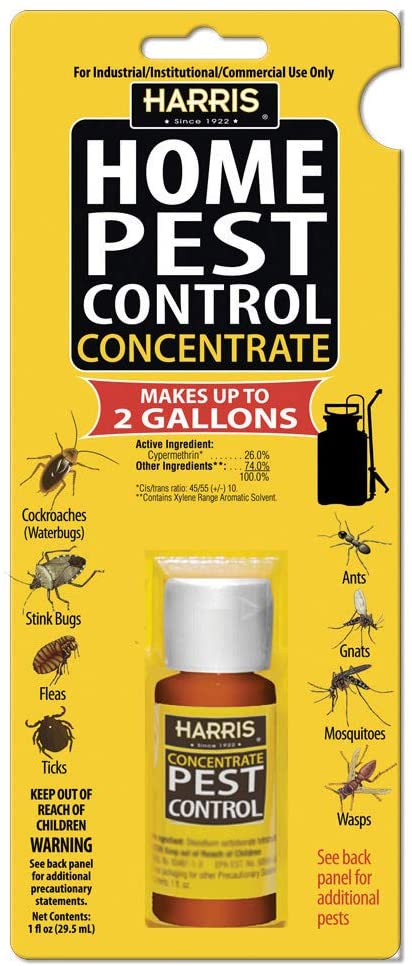Relied On A1 Exterminator Charlotte NC - Comprehensive Pest Solutions
Wiki Article
Bed Bug Treatment Break Down: Contrasting Chemical Vs. Non-Chemical Solutions
In the realm of pest control, specifically when taking care of the persistent problem of bed pests, the option in between chemical and non-chemical treatment options can be a pivotal one. Both techniques provide unique benefits and drawbacks, influencing variables such as effectiveness, security factors to consider, and total expense. By examining the nuanced details of each technique, a more clear understanding of which course to pursue in attending to a bed pest problem can be attained.Efficiency of Chemical Therapies
Chemical therapies for bed insect problems have actually been commonly acknowledged for their rapid and powerful effectiveness in getting rid of these parasites. When considering the effectiveness of chemical therapies, it is critical to recognize that they can supply a fast and detailed remedy to a bed pest issue.Furthermore, chemical treatments have the benefit of using residual effects, implying that they can proceed to get rid of bed bugs also after the preliminary application. This residual activity is especially valuable in combating any type of potential re-infestations. Furthermore, the rapid activity of chemical therapies can bring relief to people facing extreme bed insect infestations, enabling them to regain control of their home swiftly.
Safety And Security Worry About Chemical Solutions
When making use of chemical solutions for bed bug treatment is ensuring the safety and security of occupants and the atmosphere,One vital facet that needs careful consideration. While chemical treatments can be efficient in eradicating bed bugs, they may position dangers if not taken care of properly. Among the primary safety interest in chemical solutions is the possible damage they can cause to human health and wellness. Exposure to certain chemicals used in bed pest therapies can cause respiratory system concerns, skin inflammation, or other unfavorable reactions, particularly in individuals with pre-existing conditions or sensitivities. Additionally, inappropriate application or dose of chemical pesticides can cause poisonous deposits sticking around in the cured area, positioning long-term health and wellness dangers to residents.In addition, the environmental effect of chemical services is another considerable factor to consider. Some pesticides utilized in bed bug therapies may be unsafe to helpful insects, wild animals, and ecological communities if they leach right into the soil or water systems. It is necessary to utilize chemical therapies sensibly, following safety and security guidelines, and thinking about much less harmful choices to minimize these threats and make certain the efficient and safe administration of bed pest infestations.
Advantages of Non-Chemical Methods
Taking into consideration the potential security worries and environmental influence connected with chemical services for bed insect therapy, checking out non-chemical approaches presents an appealing option with several unique advantages. Non-chemical approaches offer a safer alternative for households, especially those with individuals, animals, or kids sensitive to severe chemicals. These methods get rid of the dangers of exposure to toxic compounds, reducing the potential for unfavorable health impacts. Furthermore, non-chemical treatments are eco friendly, as they do not add to air or water contamination, making them a lasting choice for pest control.Additionally, non-chemical services can be effective in targeting bed pests, including hard-to-reach locations where chemical therapies might not penetrate - A1 charlotte bed bug exterminator. Approaches such rodent control chemicals as warm treatment, vacuuming, steam cleaning, and bed mattress coverings offer comprehensive obliteration without the use of damaging chemicals.
Limitations of Non-Chemical Treatments

In addition, non-chemical therapies frequently call for multiple applications to accomplish successful elimination. This can be time-consuming and might not constantly assure complete elimination of all bed pests and their eggs, especially in covert or hard-to-reach places.
In addition, the success of non-chemical treatments heavily counts on proper execution and thoroughness, which can be challenging for individuals without specialist know-how. Inadequate application of non-chemical approaches may lead to insufficient eradication, causing persistent infestations and the requirement for extra therapies.
Therefore, while non-chemical treatments have over here their benefits, it is necessary to recognize these restrictions and consider them when identifying one of the most reliable approach for handling bed pest problems.
Expense Contrast: Chemical Vs. Non-Chemical Options
Offered the restrictions associated with non-chemical therapies, a crucial element to evaluate in the context of bed pest monitoring is the cost contrast between chemical and non-chemical alternatives. In contrast, non-chemical therapies like warmth therapy or vapor can be extra expensive, with expenses varying from $1,000 to $6,000 for an entire home. While the first cost of chemical therapies may seem reduced, multiple treatments may be called for to fully eradicate the invasion, possibly enhancing the overall expense.Verdict

Taking into consideration the prospective security worries and environmental impact linked with chemical solutions for bed bug treatment, exploring non-chemical strategies provides a promising choice with view numerous distinctive advantages.Provided the restrictions linked with non-chemical treatments, an essential facet to assess in the context of bed insect monitoring is the price comparison between chemical and non-chemical options. In comparison, non-chemical therapies like heat treatment or vapor can be extra expensive, with prices varying from $1,000 to $6,000 for an entire home. While the first expense of chemical treatments might appear lower, several therapies might be required to completely eliminate the infestation, potentially enhancing the total expense.In verdict, when contrasting chemical and non-chemical bed pest therapy options, it is crucial to think about effectiveness, security, benefits, restrictions, and cost.
Report this wiki page